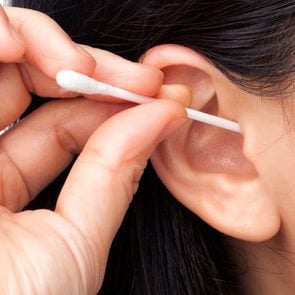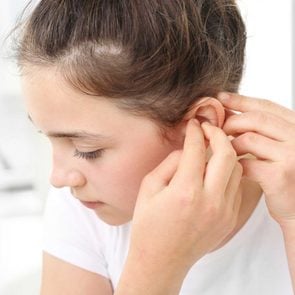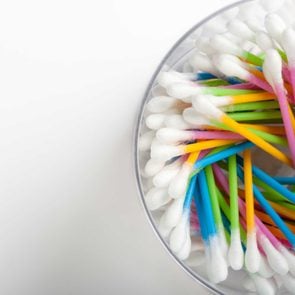Everything You Need to Know About Reusable Q-tips
Updated: Jan. 05, 2021
Reusable Q-tips are an eco-friendly alternative to single-use swabs that help reduce waste. Experts reveal their benefits and safety tips.
Our editors and experts handpick every product we feature. We may earn a commission from your purchases.
The rise of reusable q-tips
You might turn up your nose at the idea of buying a cotton swab with the intention of using it over and over again. Cotton swabs are used to remove dirt, grime, makeup, and, well, earwax, after all. But when you start to realize the waste that stems from using disposable swabs, reusable q-tips don’t seem like such a bad idea. (Here’s how to remove earwax safely.)
An estimated 1.5 billion cotton swabs are produced every day in the world and the average person throws away approximately 415 of them each year, according to a report by market intelligence company Acute Market Reports. It’s clear how choosing a reusable cotton q-tip is an eco-friendly option that can reduce your environmental footprint, as well as your spending.
Here’s a closer look at what you need to know about reusable q-tips.
What are reusable q-tips?
Just as the name suggests, reusable q-tips are meant to be used several times as opposed to the more popular brands that are disposable after a single use. “Reusable q-tips are typically made out of silicone plastic, similar to a spatula, that can be washed between uses,” explains Inna Husain, MD, assistant professor of the department of otolaryngology at Rush University Medical Center in Chicago, who says she is new to the concept. (Hear ringing in your ears? Here are some tinnitus remedies for relief.)
What are the benefits of using reusable q-tips?
The environment is better off without billions of single-use plastic items poured into the planet each day.
Plastic cotton swabs, the kind that are meant to be disposable, don’t break down once they leave your ear. (While some are made with paper sticks and are biodegradable, they contribute to ever-increasing landfill issues.) When plastic swabs are flushed or thrown away, they end up in waterways as microplastics. Those can be ingested by marine life, such as phytoplankton, in the ocean, which can then be eaten by larger species like fish, oysters, and whales.
These microplastics can sit in the digestive tracts of these animals, preventing their ability or urge to consume food and inevitably causing them to starve and die.
(These facts will make you stop using plastic.)
Reusable q-tips may also be safer, as they are less likely to break off and get stuck in the ear canal the way that disposable kinds can, notes Darius Kohan, MD, otolaryngologist and neurotologist at Northwell Health in New York City. When this happens and cotton is deposited into the ear canal, Dr. Kohan warns that an ear infection can result and, in some cases, the cotton can accidentally be pushed against eardrum or canal skin and cause greater damage.
Are reusable q-tips safe?
So long as a reusable swab can be cleaned thoroughly between each use, Dr. Husain gives them a thumbs up for safety. She recommends using hot water and soap to clean them and ensuring you’re spending at least 60 seconds scrubbing vigorously as you would if you were cleaning your hands. If there is a lot of debris on the swab, she recommends soaking it in hot water for at least 10 minutes before washing it.
Dr. Husain suggests allowing the swab to fully air dry before reuse. You can also use an at-home disinfectant such as rubbing alcohol to fully sanitize the swab. (These are the body parts you’re not washing enough.)
“In general, reusable q-tips are safe for makeup application and cleaning, but I would caution against use in the ear canal,” she adds. “Q-tips actually can push cerumen (earwax) further into the ear canal making it obstructive,” says Dr. Husain. Also, she echoes Dr. Kohan’s concern of a reusable swab causing injury to the eardrum (i.e. perforation) of the ear canal if placed too deeply.
“I would not recommend using them in the ear canal itself—only the outside of the ear,” says Dr. Husain. She adds, “This is also the same for disposable q-tips.”
Reusable q-tip brands to know
If you’re looking to give reusable q-tips a try, here are some of the top recommended brands on the market today. (Have ear pain? Try these earache home remedies.)

LastSwab Reusable Cotton Swabs for Ear Cleaning
$12
LastSwab is one of the most popular brands of reusable q-tips—and it’s clear to see why. These reusable swabs are sustainable, sanitary, and have the capacity to replace 1,000 single-use cotton swabs. They have a durable and compact nylon core with a flexible tip made from silicone on each end. They even come with a convenient carrying case that is biodegradable and great for travel.

Uramoto Reusable Cotton Swabs
$10
Uramoto took their original model and made it even better. It’s reusable and made from standard medical-grade silicone, which is 100 percent safe and non-toxic. It’s great for cleaning your ears or removing pesky makeup—even the waterproof kind.

Boeteco Reusable Ear Swab
$12
This reusable q-tip from Boeteco is made using silicone and the strongest medical-grade adhesive to fully guarantee that neither end will break off into your ear (and save you a trip to the emergency room). Your purchase comes with two kits that each contain four swabs (eight swabs total). They have two shapes—one “regular” shape and one with a pointy tip that makes for easy cleaning. This product also comes with a 3-year warranty.
![]()
Torokom 4-Count Reusable Silicone Q-Tip
$10
This pack of reusable Q-tips from Torokom comes with a set of four in a handy and reusable case. They are environmentally friendly and made out of 100 percent safe and non-toxic medical silicone. Use them to clean your ears, makeup, or hard-to-reach places like your computer keyboard.
![]()
Aodesy Reusable Silicone Cotton Swabs
$12
Each end of this Aodesy reusable swab is made with medical-grade silicone that’s soft, flexible and, of course, can be used time and time again. Your purchase comes with a slim and portable case that’s small enough to fit right into your wallet.
















